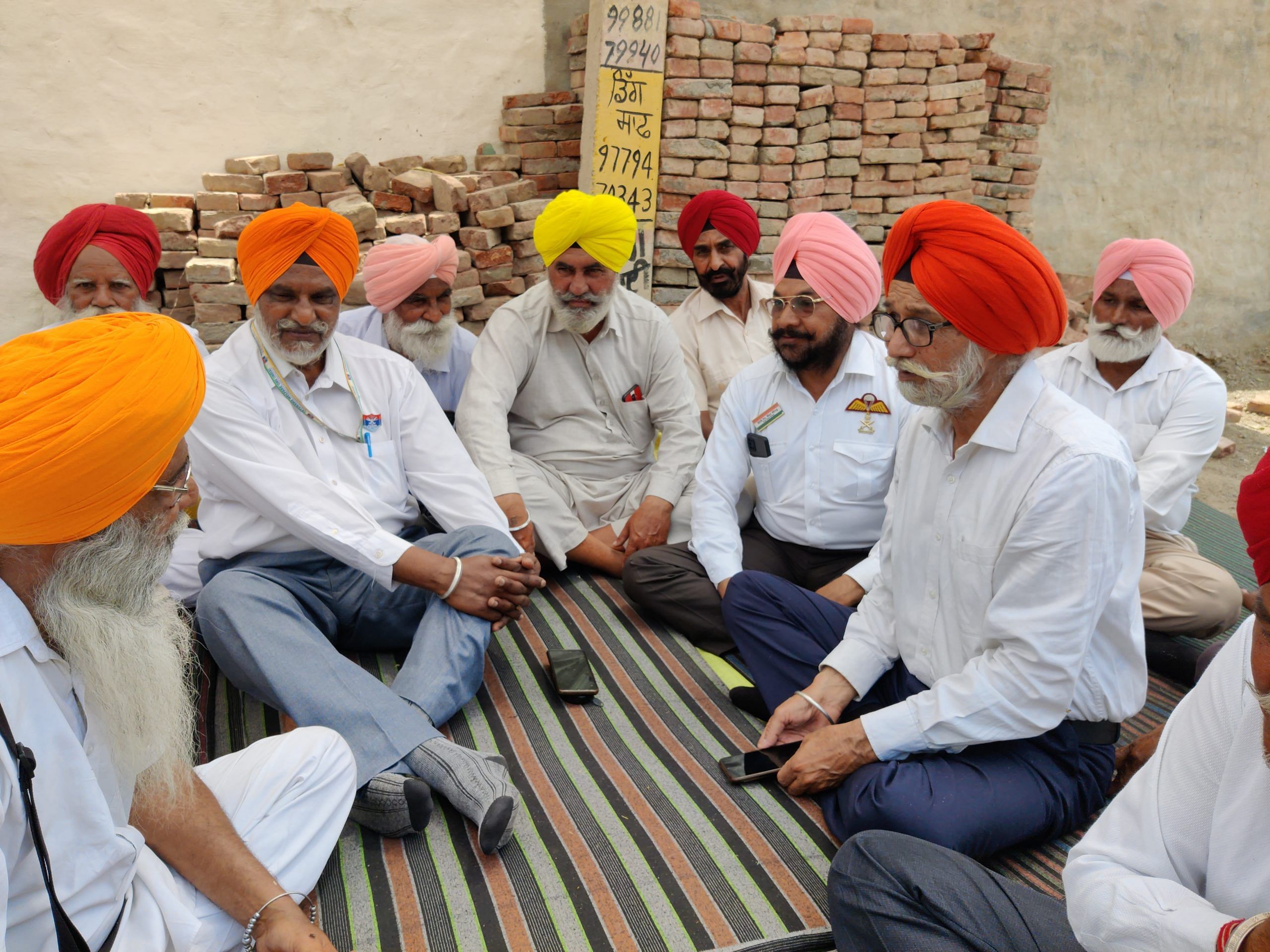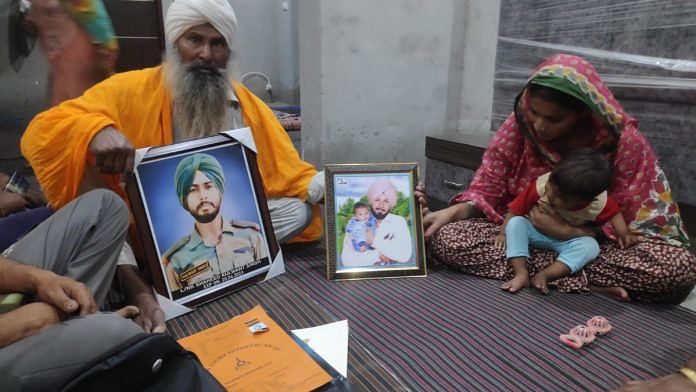A string of dried sticks and rattle toys hang outside Kulwant Singh’s unpainted two-story house in Moga. It’s a sign of a son being born to the family. But its big rooms are sapped of all happiness. Women wail intermittently and Kulwant’s wife, Hardeep Kaur, sits in a corner, staring blankly. Her 18-month-old-daughter hops around, oblivious of the tragedy that has struck the family and her five-month-old son sleeps in a pram.
Kulwant was one of the five soldiers who were killed when the truck they were travelling in was ambushed with grenades in Poonch on the afternoon of 20 April. In a photograph sent by the Army to his family from the spot, Kulwant can be seen lying face down, a few metres away from the truck. His legs burnt and fatal injuries on his head.
For his family in Moga, tragedy has struck twice. Kulwant was only two-and-a-half years old in 1993 when his father, Baldev Singh, was killed in Kashmir after his truck fell in a ditch. And now, 32-year-old son’s death has left his family broken.
“Kulwant had planned so many things for his family. He had already spent 13 years of service and had only two more years left before he could retire. He wanted to be at home with his family. No one had thought this would happen to him,” said Gagandeep Singh, Kulwant’s brother-in-law.
Outside his mother’s home in Charik village, a group of Army veterans from around Moga sat in crisp white shirts, in solidarity. It’s an honour to die for the country, they say. But for the family, the pain of sacrificing two of its men is immense.
“Kulwant’s is a family of martyrs. To die for the nation is an honour all of us could not have. We are proud of the family,” says former captain Amarjit Singh.

Also read: Buried under Mt Annapurna snow for 3 days, no oxygen, Anurag Maloo made it with 3 miracles
A difficult childhood
Kulwant had no memory of his father. He, however, grew up hearing about Baldev’s martyrdom from his relatives. Kulwant’s only photo with Baldev, clicked in a studio, is enlarged and framed in a golden frame.
“Kulwant idealised his father. He decided that he will join the Army when he was still in school. And he used to prepare for it. He would run, exercise and stay fit. He found out about the training and paperwork needed to apply and he had a better chance at it because of his father’s service,” says Barma Singh, his childhood friend.
Financial difficulties after his father’s death drove Kulwant’s mother, Harjinder Kaur, who was still in her teens, to remarry. While Kulwant stayed with his mother and his step-family, he could never get the love and affection he craved as a child, his friends and neighbours tell ThePrint.
Kulwant was then a child raised by the community, say his neighbours. He would spend days at his friends’ homes and their parents would feed him and treat him like their own children. Whenever he would come on a break from his Army job, he would visit them all.
“Kulwant used to call me daddy. I loved him more than my own two sons, who were his friends. He always missed his own father,” says Resham Singh, who performed the rituals of a father at Kulwant’s wedding in 2021.
Mourning at her home, Harjinder denies the claim that Kulwant was aloof from the family.
“I always cared for him and he met me on his last break in April as well. I was the one who had gone to drop him at the training centre when he was selected. I never thought this sorrow would fall upon me again. First, my husband and now my son are gone, both in the same way,” says Harjinder.
Financial difficulty at home was another reason why Kulwant’s resolve to follow in his father’s footsteps and join the Army grew stronger. He started doing odd jobs as a labourer while still in school. And when he was selected in 2011, he gave it his all.
“The job made him feel closer to his father. He used to say that his father is always there to protect him,” says Charanjeet Kaur, his step-sister.
Also read: IAS officer lynched by mob. 30 yrs on, a statue, angry cadre, and a smiling CM with the killer
Making his house into a home
Brick by brick, Kulwant started building his house in Moga city with his savings. During one holiday, he brought a customised blue-and-white sofa set; on another, he installed wooden doors on all rooms. His death has halted the dream.
“He wanted to do so much. He used to say to me that life was very unfair to him. He wanted to give everything to our children that he was deprived of in his childhood – a big home, good education. He wanted to send his daughter to an English medium school. But most of all, he wanted to give the children the love of a father, which he always missed,” says Hardeep, his wife.
In his upcoming break, Kulwant had planned to buy a small car to protect his children from harsh summers and winters. He used to call home every half-an-hour and had recently bought a new smartphone on monthly instalments.
When his family did not receive his call all evening on 20 April, they assumed that his phone’s battery must have died. But by night, the fateful call came from the Army, informing them of Kulwant’s death.
The next day, when his body arrived in the Army cavalcade, Indian flags waving, the entire village gathered for his funeral.
Though a proud moment for the village, Kulwant’s family and the family of Army veterans, there were murmurs among the veterans about how the killings of soldiers at the hands of terrorists must stop.
“The areas where Kulwant was serving is very difficult. It is known for terrorist activity. The Army should have moved in bigger groups,” says captain (retd) Bikkar Singh.
The sacrifice of our soldiers breaks families, he adds, and diplomacy is the channel that should be adopted to stop such attacks.
“Countries were born out of hate. But a solution to terrorism should be solved with love,” says former captain Balvinder Singh.
“He (Kulwant) had asked a neighbour to order the smartphone from Amazon. But he asked us not to start the phone just yet. He wanted to set it up on his own,” says Gagandeep. The brand-new phone is lying locked in the cupboard.
It was his pull towards his family that soon after he got married, he requested for a posting in Jammu and Kashmir. Home was closer. He could reach home within a day. But he came home last, packed in a coffin.
(Edited by Anurag Chaubey)



